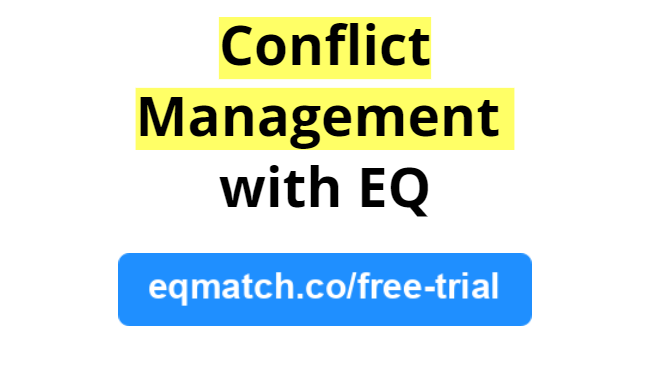Conflict is the beginning of consciousness!
Great words by M. Esther Harding.
Did you know that 85% of employees experience conflicts at work?
Given that conflict in the workplace can result in loss of productivity, and increased stress, it becomes important for leaders (HR leaders in particular) to dive into conflict management.
Without further ado, let’s discuss conflict management at work, and explore various conflict management strategies, skills, and examples to help you effectively manage conflict in the workplace.
What is conflict?
From a psychological standpoint, conflict refers to the “arousal of two or more strong motives that cannot be solved together.”
Conflict can range from minor disagreements to major disputes and can occur at the personal, group, or organizational levels.
Someone has rightly said- Conflict is not something to be ashamed of, it’s something to be managed.
As you may know, conflict is an inevitable part of life.
And the workplace is no exception.
In fact, the workplace can be a breeding ground for conflict due to the diverse personalities, opinions, and goals of employees.
Conflict can arise between coworkers, between employees and managers, or between different departments or teams.
For this reason, Human Resources leaders need to understand conflict management and develop strategies to handle conflicts effectively.
What is a conflict management approach?
Conflict management involves handling and resolving conflicts in a constructive manner.
Managing conflict is about identifying and addressing the underlying issues that cause conflicts, finding mutually acceptable solutions, and restoring positive relationships.
Conflict management at work is about minimizing the negative impact of conflicts on individuals, teams, and the organization as a whole.

Why is Conflict Management Important in the Workplace?
Let’s talk about why conflict management is critical for business growth.
Conflicts can negatively impact employee morale, productivity, and job satisfaction.
When left unresolved, conflicts can lead to absenteeism, turnover, and even lawsuits.
On the other hand, a strategic conflict management approach can promote a positive and healthy work environment, where employees feel respected, heard, and valued.
Individuals with diverse perspectives and ideas collaborating effectively fosters creativity and innovation.
Last, but not least.
Conflict management can improve organizational performance by facilitating better decision-making, communication, and problem-solving.
What causes Workplace Conflicts?
Workplace conflicts can arise from a variety of sources, such as differences in values, priorities, communication styles, and personalities.
Competition for resources, unclear roles and responsibilities, performance issues, and leadership styles may also result in conflicts between employees.
Theory of Conflict Management
Maybe we need to rephrase the title to “theories” given a large number of approaches to conflict management.
Some of these theories of conflict management can help HR decision-makers better understand and manage conflicts in the workplace.
Two main theories of conflict management exist- the traditional theory and the modern theory.
The traditional theory of conflict management observes the affected parties as troublemakers.
In contrast, modern theory considers conflict as a natural and inevitable outcome of human interaction.
This theory maintains that conflict situations can help generate new ideas.

Strategies of Conflict Management: What are the 5 types of conflict management?
Effective conflict management at work requires specific strategies and skills.
Let’s discuss some of the most commonly used strategies of conflict management.
Accommodation
This approach to managing conflict puts emphasis on the needs and interests of others before one’s own.
One can leverage the accommodation style of conflict management for minor issues.
It can also help in situations when preserving relationships is important, or when the other party has more power or expertise.
A word of caution- Overusing this style can lead to feelings of resentment and can result in the individual’s needs and goals being ignored.
Competing
This style of conflict management is almost opposite to the accommodation style.
That is, the competitive style involves pursuing one’s own interests at the expense of others.
If you want quick and decisive action, you can use the competitive style of managing conflict.
This approach is also useful when the other party is being unreasonable or unethical.
A downside to this approach is that it can lead to damaged relationships and a win-lose mentality.
Collaboration
When the goal is to work together to find a mutually beneficial solution, the approach is referred to as the collaboration style.
For complex issues, or for situations calling for creative solutions, the collaboration style of conflict management might come in handy.
However, this style requires time, effort, and open communication, and may not be appropriate for urgent or time-sensitive issues.
Avoiding
The goal of this approach to conflict management is to ignore the conflict, remove the affected parties, or evade it.
An example of this could be removing team members from a project, pushing deadlines, or reassigning the affected people to different departments.
The biggest benefit of this approach is time (and space).
Giving people time and space can help them calm down, and can address some issues.
On the flip side, this conflict management approach can actually accelerate conflict when used in the wrong situations.
Compromising
The last of our five types of conflict management is compromising.
Compromising aims to find the middle ground.
Often termed as a lose-lose approach, compromising involves both parties giving up a few things to agree on larger issues.
Compromising as a conflict management approach works best when time is an issue.
While this approach helps resolve issues quickly, and can also facilitate collaboration eventually, it can also lead to resentment.
Conflict Management Skills
It requires specific skills to manage conflicts effectively.
Let’s discuss some of the most important skills of conflict management.
Emotional Intelligence: Understanding and Managing Emotions in Conflict
Emotional Intelligence is the ability to recognize and understand one’s own emotions and the emotions of others.
EQ (also called EI) helps people manage emotions in conflict situations, stay calm and composed, and respond in a way that promotes productive conversation and problem-solving.
No wonder why there is immense importance of emotional intelligence in human resource management.
Emotional intelligence skills such as self-awareness, self-regulation, empathy, and social skills help people manage conflicts effectively.
Emotional intelligence training and coaching can help people better understand the needs and perspectives of others, build trust and rapport, and work towards a more positive resolution.
Communication Skills: Effective Communication in Conflict Resolution
Effective communication is essential in conflict resolution.
What is effective communication?
It involves active listening, asking clarifying questions, and expressing oneself clearly and respectfully.
With good communication skills, people can understand the root causes of the conflict, communicate their own needs and goals, and work collaboratively towards a solution.
Effective communication can also help de-escalate emotions and prevent misunderstandings.
Negotiation Skills: Collaborative Problem-Solving in Conflict Resolution
In a successful negotiation, everyone wins.
The objective of negotiation should be agreement, not victory.
Negotiation skills involve the ability to work collaboratively with others to find a mutually beneficial solution to the conflict.
These skills include identifying the underlying interests and needs of all parties involved, brainstorming options for resolution, and finding a compromise that meets the needs of all parties.
By developing negotiation skills, one can turn conflicts into opportunities for growth and relationship-building.

Conflict Management Training & Benefits
It can be challenging to manage conflicts in the workplace.
This is why conflict management training can be an effective way to develop the skills and strategies needed to manage conflicts in the workplace.
There are a variety of conflict management training programs available, ranging from online courses and workshops to in-person training sessions and coaching.
Some of these programs may focus on developing specific skills, such as communication or negotiation.
Other programs can put more emphasis on providing a more comprehensive overview of conflict management theory and strategies.
The Benefits of Conflict Management Training
Developing conflict management skills can help people improve their relationships with coworkers, reduce stress and anxiety, and enhance their overall job performance.
Conflict management makes a lot of business sense too.
It can lead to improved communication, increased productivity, and a more positive work environment.
Examples of Conflict Management Training Programs
There are many different conflict management training programs available, each with its own approach and focus.
The Thomas-Kilmann Conflict Mode Instrument (TKI) assessment covers 5 Styles of Conflict Management- competing, collaborating, compromising, avoiding, and accommodating.
TKI aims at measuring an individual’s preferences across these five styles.
Please note that each of these styles bring its own strengths and weaknesses and is appropriate for different situations.
For example, the competing style is useful when quick and decisive action is needed.
On the other hand, the collaborating style is effective for complex issues that require creative solutions.
Similarly, the Crucial Conversations training program focuses on effective communication skills in high-stress situations.
Conflict Management in Teams
Conflict can arise in any team setting.
Hence, it’s important for team members and leaders alike to be equipped with the skills and strategies needed to manage it effectively.
Let’s address the key aspects of conflict management in teams.
Team Conflict Management
When conflict arises within a team, it’s important to address it quickly and effectively.
Encouraging open communication and active listening, clarifying goals and expectations, and finding a solution that meets the needs of all team members, can help in this regard.
It’s also important for team members to be able to identify and apply different conflict management styles mentioned earlier (accommodation, competing, avoiding, collaboration, or compromising), depending on the situation.
Leadership in Conflict Management
Leaders play a crucial role in managing conflict within teams.
Effective leaders are able to remain calm and objective in the face of conflict, listen actively to all team members, and guide the team towards a solution that works for everyone.
They may also need to facilitate difficult conversations or mediate disputes between team members.
Leadership conflict management training can be a useful way to develop these skills.
Conflict Management in an Organization
Managing conflict within an organization can be a complex and challenging task, particularly in larger organizations with many different departments and stakeholders.
Effective conflict management at the organizational level involves creating a culture of open communication, fostering collaboration and problem-solving, and developing clear policies and procedures for conflict resolution.
Personality Testing for Employees
Conflict management training for employees and leaders can also be helpful in promoting effective conflict management throughout the organization.
Personality tests can be a useful tool for employers to assess how candidates may handle conflict in the workplace.
A personality test for hiring can help employers understand an applicant’s personality traits and tendencies.
This can help employers assess if the applicants have the necessary skills and characteristics to manage conflicts effectively.
For example, people with high emotional intelligence and strong communication skills could (most likely) handle conflicts better than those who struggle with emotional regulation or have poor communication abilities.
Enterprise recruitment software incorporating personality assessment tests can also provide insights into an individual’s preferred conflict management style, such as whether they tend to be more collaborative or competitive in their approach.
HR professionals can focus on candidates who demonstrate strong conflict management skills and tendencies.
This, in turn, can help create a more harmonious and productive workplace.
Workplace Conflict Management Examples
Let’s cover workplace conflict management with examples to illustrate how conflict can be resolved effectively.
Example 1: Miscommunication between team members
Often, when working on a project, team members can have misunderstandings about the task(s).
Let’s use this as an example.
They had different ideas about what was required, and they were both frustrated.
They can resolve the conflict by having a 1:1 discussion where they make time and space for each other to explain their perspectives.
If a 1:1 doesn’t help, the team leader can facilitate the discussion to help them come up with a plan to avoid similar issues in the future.
Example 2: Personal conflicts
Let’s say two colleagues had a personal conflict due to a disagreement over a decision.
One of them accused the other of taking credit for their work.
The team leader listened to both sides, identified the root cause of the conflict, and worked with them to find common ground.
Example 3: Conflict between team members and management
A team was unhappy with the direction their project was taking and felt that management wasn’t listening to their concerns.
They scheduled a meeting with management to discuss their concerns, and the team leader facilitated the discussion.
The team was able to express their opinions, and management listened and addressed their concerns.
Management also explained the rationale behind their decisions, and the team came to a better understanding of the project’s direction.
These are just a few examples of conflict in the workplace.
Final Thoughts
Conflict is an inevitable part of life, especially in the workplace where people from diverse backgrounds and perspectives come together.
However, with effective conflict management strategies, conflicts can be resolved in a peaceful and constructive manner.
Conflict management involves various theories, strategies, and skills that can be learned through conflict management training programs.
Emotional intelligence, communication skills, and negotiation skills are some of the key skills required for successful conflict resolution.
Conflict management is not only important for resolving conflicts but also for preventing them from escalating into bigger issues that can impact productivity and morale in the workplace.
At EQMatch, we believe that conflict management should be an essential part of organizational culture and leadership.
With the right tools and approaches, conflicts can be transformed into opportunities for growth, innovation, and collaboration.
Let’s embrace conflict management as a means of achieving positive outcomes and creating a harmonious workplace environment.



No responses yet